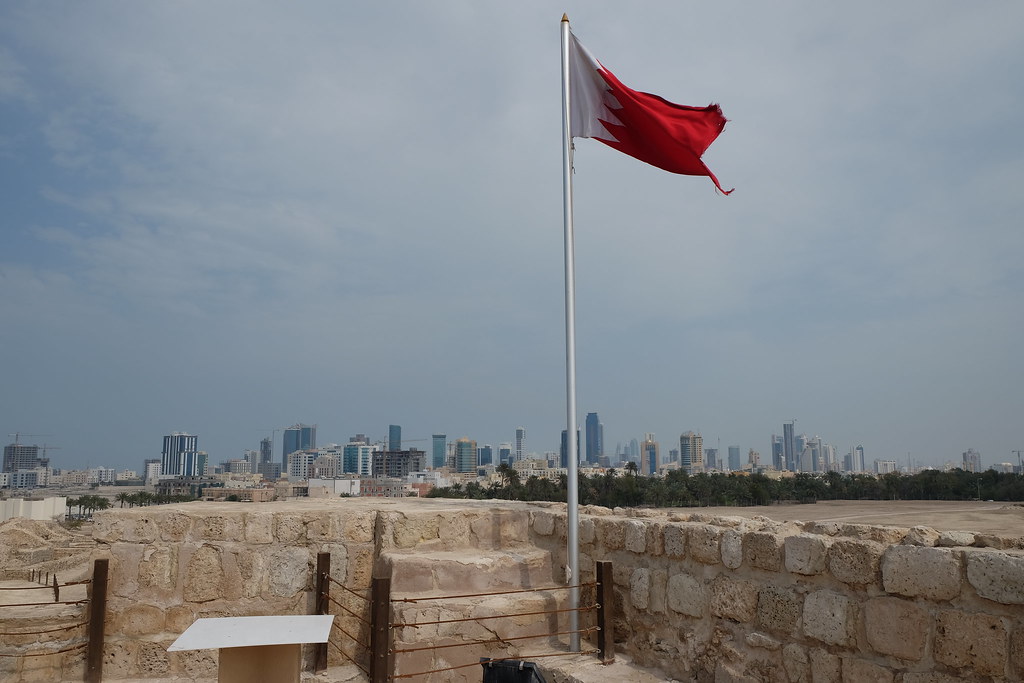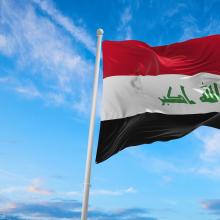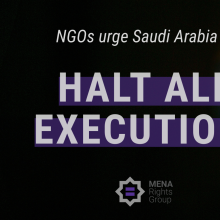August 11, 2020

His Majesty, King Hamad bin Isa Al Khalifa, Kingdom of Bahrain
In light of the recent confirmation by Bahrain’s Court of Cassation of four death sentences, we write to urge you to commute all current death sentences and to establish an official moratorium on executions.
On 15 June 2020, the Court of Cassation confirmed death sentences handed down to Husain Abdulla Khalil (“al-Rashed”) and Zuhair Ebrahim Abbas; on 13 July 2020, it did the same in respect to Mohamed Ramadhan Husain and Husain Ali (Moosa) Mohamed.
Under Article 328 of the Code of Criminal Procedure once a death sentence has been upheld by Bahrain’s highest court, its Court of Cassation, the Minister of Justice refers the case to the King for assent, so that the death penalty may be implemented. Only you, Your Highness, can commute the sentences to save the lives of the 12 men named below.
The death penalty is the ultimate irreversible cruel punishment. We believe that the death penalty is not an effective way to deter crime and that it is discriminatory: it tends to be disproportionately carried out against minorities and those with less advantaged socio-economic backgrounds. Its application can be subject to political motivation. We believe that your decision to commute all death sentences would have a hugely beneficial impact on Bahraini society at this difficult time and help foster a culture where the right to life is respected.
Successive resolutions passed by the United Nations General Assembly have repeatedly called on countries to declare a universal moratorium on the use of the death penalty and to progressively restrict the practice by reducing the offenses for which it might be imposed, leading to its eventual abolition. At the time of writing, Amnesty International classifies 142 states in the world as abolitionist on the death penalty in law or practice. We urge Bahrain to join this global movement.
Setting aside the merits of specific cases, summarily assessed in an April 2018 Salam for Democracy and Human Rights (SALAM DHR) statement, we recall that you have previously commuted four death sentences, handed down by the Military Court of Cassation, to life imprisonment.[1]
Since the government does not publish the names of those on death row, we are only able to call for the commutation of those individuals whose case details are widely known. These cases, and the chronologically ordered dates that their sentences were upheld by the Court of Cassation, are as follows:
- Maher Abbas Yusuf (“al-Khabbaz”) - 29/01/2018
- Husain Ebrahim Marzooq - 26/02/2018
- Sayed Ahmed al-Abbar - 21/05/2018
- Husain Ali Jasim - 21/05/2018
- Salman Isa Salman - 04/06/2018
- Mohamed Radhi Hasan - 25/02/2019
- Husain Abdulla Marhoon - 20/05/2019
- Moosa Abdulla Jaafar - 03/06/2019
- Husain Abdulla Khalil - 15/06/2020
- Zuhair Ebrahim Abdulla - 15/06/2020
- Mohamed Ramadhan Husain -13/07/2020
- Husain Ali (Moosa) Mohamed - 13/07/2020
We urge you to commute the death sentences of these people and all other death sentences in the country.
Signatories:
Ensemble Contre la Peine de Mort
Gulf Institute for Democracy and Human Rights
Organisation Mondiale Contre la Torture
Salam for Democracy and Human Rights
Background information
Bahrain is a state party to the International Covenant on Civil and Political Rights and the Convention Against Torture and Other Cruel, Inhuman and Degrading Treatment or Punishment.
In January 2019, at its 15th session, the Arab Human Rights Committee (AHRC) assessed Bahrain’s implementation of the Arab Charter on Human Rights. In paragraphs 16 and 17 of its Concluding Observations the AHRC noted that the Constitution does not contain provisions to protect the right to life as stipulated by Article 5 of the Charter.
In November 2018, in paragraph 31 of its Concluding Observations on Bahrain’s fulfilment of the International Covenant on Civil and Political Rights, the United Nations’ Human Rights Committee (HRC) expressed concern that Bahraini law authorizes the death penalty for offences such as drug trafficking that fall short of the threshold of the “most serious crimes” (i.e. intentional killings).
The HRC expressed concern over allegations that “death sentences have been imposed on the basis of confessions obtained under duress or torture or in the context of trials that did not meet [international] standards”. The HRC also called for re-instatement of the moratorium on the death penalty and for Bahrain to accede to the Second Optional Protocol to the Covenant, aiming at the abolition of the death penalty.
In January 2017 Bahrain executed three people: Sami Merza Mushaima, 42; Abbas Jamil al-Samea, 27 and Ali AbdulShahid al-Singace, 21. The authorities had arrested them and seven others, who received life sentences, in connection with the death of three police officers. In 2015, they were all convicted in an unfair trial which used evidence extracted through torture. Despite this, Bahrain proceeded to execute the three men on 15 January 2017.
While no executions were reported in 2018, in July 2019, the government executed Ali Mohamed al-Arab, 25, and his Ahmed Isa al-Malali, 24, alongside a Bangladeshi migrant labourer whose name appears never to have been made public. The courts sentenced al-Arab and al-Malali to death in connection with their purported role in the prison break from Jaw on 1 January 2017. Officials detained both men in 2017, torturing Ali al-Arab in custody.
Our review of these cases calls into question the government’s commitment to and respect for due process. On 17 May 2020, SALAM DHR wrote via email to the Office of the Ombudsman, Ministry of the Interior, questioning the evidence used in these cases and asking the Bahraini government to state the precise date the defendants were granted effective access to independent legal representation. Specifically, the organisation called on the government to release the forensic reports for independent assessment in the cases of (1) Maher Abbas Yusuf (“al-Khabbaz”), (2) Husain Ebrahim Marzooq, (3) Sayed Ahmed al-Abbar and (4) Husain Ali Jasim. In the cases of (5) Salman Isa Salman, (6) Mohamed Radhi Hasan, (7) Husain Abdulla Marhoon and (8) Moosa Abdulla Jaafar, SALAM DHR asked exactly when each had effective access to legal representation. As of 27 June, the Office of the Ombudsman had not replied.
With regard to (9), Husain Abdulla Khalil (“al-Rashed”), the authorities arrested him on 30 December 2017 and charged him and 22 others with organizing two bombings in the villages of Damistan and Karzakan on 8-9 December 2014 that killed a police officer and an elderly Bahraini civilian and seriously injured a migrant laborer. The authorities held him almost completely incommunicado for over a month following his detention, allowing him only a few short calls to his family to tell them that he was in detention. The security forces who detained him presented no warrants for arrest or for search and entry of the house where he was arrested and struck him while taking him into custody. Husain Abdulla Khalil was tried in absentia prior to his arrest and it is not, at present, known when after his detention he was granted effective access to a lawyer.
With respect to (10) Zuhair Ebrahim Abbas, the Special Rapporteur on Extrajudicial, Summary or Arbitrary Executions, the Special Rapporteur on the Promotion and Protection of Human Rights and Fundamental Freedoms while Countering Terrorism, and the Special Rapporteur on Torture and Other Cruel, Inhuman or Degrading Treatment or Punishment have written to the Bahraini government relaying allegations that, following his detention on 2 November 2017, officials held him:
“[...] in incommunicado detention for 55 days and reportedly subjected him to torture and ill-treatment which included beatings, forced nudity and sexual assault. His wife was also beaten separately in her home while Mr Abdullah was in detention. Officers also threatened her at gunpoint and subjected her to threats of rape. After 13 days of torture Mr Abdullah was reportedly forced to sign a false confession to a number of charges alleged to have occurred between 2011 and 2017 including membership to a terrorist organisation, making and detonating explosives, targeting security forces and participating in the murder of security forces by planting or detonating explosives.”
On 29 November 2018, the Fourth High Criminal Court sentenced him to death. In its reply to the Special Rapporteurs, Bahrain states that “examination by a forensic physician failed to reveal any injuries consistent with [the defendant’s] allegation,” yet fails to disclose the most basic relevant facts, such as the crucial question of time elapsed between alleged period of torture and date of examination.[2] Bahrain states that it “completed its investigation by questioning a member of the Public Security Forces who had interrogated the complainant…. As he denied the allegation,” the case was closed “on account of the lack of evidence.” It is patently obvious that such cursory and non-transparent steps do not amount to a serious and thorough investigation.
Finally, the case against (13) Mohamed Ramadhan Husain and (14) Husain Ali (Moosa) Mohamed is grossly flawed. According to credible testimony that was substantiated in relevant part even by an agency of the Bahraini government (the Special Investigation Unit, or SIU), both men were subjected to torture – including beatings, suspension from limbs, and electrocution – in order to extract “confessions”. Husain Ali Moosa was ultimately coerced to sign such a “confession”, though Mohamed Ramadhan Husain did not. Despite the Special Investigation Unit’s finding that a credible allegation of torture had been raised, the judgment of Bahrain’s Court of Appeals on re-examination, now upheld by the Court of Cassation, continued to maintain that the trial court had placed proper reliance on Husain Ali Moosa’s “confession” and claimed incorrectly that the non-existent confession of Mohamed Ramadhan Husain was also credible evidence, repeating a fundamental error of fact that appears at all levels of the court proceedings. We note further that, while Bahrain now claims that the SIU investigation and the consequent appellate re-examination of the case vindicate its justice system as a thorough and independent branch of government, it has failed to release any of these materials into the public sphere where they can be subjected to proper critical scrutiny by Bahraini and international observers.
On 19 July 2020, Bahrain’s Ombudsman responded to SALAM DHR’s request for disclosure of key documents and dates in these cases by stating that all aspects of all cases referred to its office were “out of its remit”. The statute governing the Ombudsman’s work in fact gives it the mandate to examine all illegal acts alleged against Ministry of Interior employees.
[1] Three of the individuals, Fadhel Sayed Abbas Radhi, Sayed Alawi Husain and Mohamed AbdulHasan al-Mutaghawi were civilians; Mubarak Adel Muhana was in the military. The Military Court of Cassation had convicted the four men on charges of intent to assassinate the general commander of the Bahrain Defense Force.
[2] As noted in the relevant professional standard, “most lesions heal within about six weeks of torture, leaving no scars or, at most, non-specific scars.... [T]orturers [may] use techniques that prevent or limit detectable signs of injury. Under such circumstances, the physical examination may be within normal limits, but this in no way negates allegations of torture.” United Nations Office of the High Commissioner for Human Rights, Istanbul Protocol: Manual on the Effective Investigation and Documentation of Torture and Other Cruel, Inhuman or Degrading Treatment or Punishment, Professional Training Series No. 8, Rev. 1 (New York, 2004), para. 172, p. 34.






